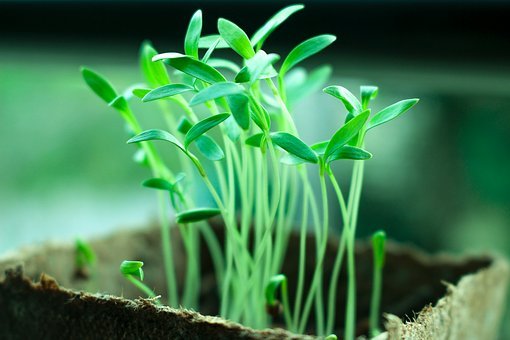Starting vegetables indoors from seed is easy and inexpensive. It also gives the gardener more control over varieties and timing.
Starting seeds indoors is a fairly easy process and can be quite fun. Starting seed is especially useful if saving money is a goal, or for the person wanting less than a six pack of a particular variety. Lettuce, most herbs, beans, squash, and corn are a breeze to start from seed.

Soaking Seeds
Large seeds such as beans, corn, and squash should be soaked overnight in water, or for up to 24 hours. This softens the seed coat and causes the seed to expand, greatly reducing sprout time.
Using Seed Trays
Seed trays from the garden center with clear plastic lids work very well for starting seeds. Some come with peat plugs or small peat pots which make handling and planting of seedlings very easy. If not, the tray can be filled with a seed starting mix or newspaper pots.
Take out containers with clear lids, or plastic containers that hold lettuce or grapes can be used as seed starting trays.
Making a Seed Starting Mix
Seed starting mix can be purchased or made. To make a seed starter mix, use compost mixed with a little perlite. Peat moss can also be added.
Planting Seeds in Tray
Plant 2 or 3 seeds per small pot or cell. Tiny seeds, such as lettuce, can be started in toilet paper or paper towel. Fold a length of paper towel or toilet paper in half. Open the paper and carefully space seeds along the crease. Mist the paper with a spray bottle and fold outer edge toward the creased edge. This paper can then be planted in a flat seed tray without cells.
Making a Mini Greenhouse
Once the seeds are planted, water well and cover. Covering is important because it keeps heat and moisture in. Place in a warm area that does not cool down at night. To keep seeds warm, place a heating pad from the drug store underneath.Keep the greenhouse covered until seeds sprout.
Caring for New Seedlings
After the seeds have fully sprouted, remove the cover. This prevents rotting and fungal problems. The heating pad can be kept beneath if needed. Make sure the seedlings receive at least 12 hours of light a day. Fluorescent shop lights work very well for this, as well as placement in front of a sunny window.Be sure to water seedlings and don't let them dry out. Watering with compost tea or a liquid kelp solution helps seedlings grow vigorous and healthy.
Transplanting Seedlings
Before transplanting to the garden, have the seedlings spend a few hours a day outdoors. This prevents shock from a sudden change in temperature and or moisture conditions. Covering new seedlings with a cold frame or using a wall of water doesn't hurt either.Starting plants from seeds isn't difficult and gives the grower more control and flexibility over garden crops.
Great post
Downvoting a post can decrease pending rewards and make it less visible. Common reasons:
Submit